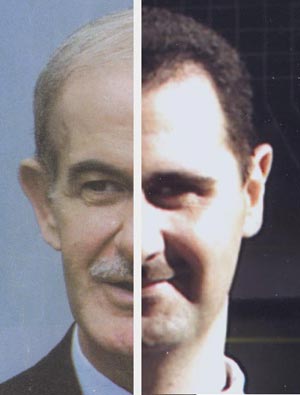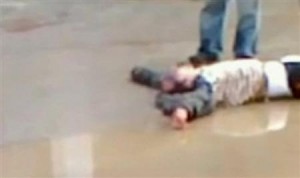 IN FEBRUARY 1982, the Syrian dictatorship headed by Hafez al-Assad responded to an uprising in the city of Hama with extraordinary violence. The town was indiscriminately bombarded by tanks and artillery; security forces then swept through the rubble and massacred the survivors. Estimates of the final death toll ranged from 10,000 to 40,000 or more. Hama became a symbol in the Arab world of what its authoritarian regimes were prepared to do to keep themselves in power.
IN FEBRUARY 1982, the Syrian dictatorship headed by Hafez al-Assad responded to an uprising in the city of Hama with extraordinary violence. The town was indiscriminately bombarded by tanks and artillery; security forces then swept through the rubble and massacred the survivors. Estimates of the final death toll ranged from 10,000 to 40,000 or more. Hama became a symbol in the Arab world of what its authoritarian regimes were prepared to do to keep themselves in power.
Now the Arab uprising of 2011 has reached Syria, and Assad’s son, Bashar, is trying to apply his father’s solution. Early Wednesday, security forces stormed a mosque in the city of Daraa , where there had been five days of protest marches, and opened fire with live ammunition. According to Western news reports, the assault on the surrounding neighborhood continued through the day; an Associated Press reporter heard automatic weapons fire. At least 15 people were killed, including a prominent local doctor who was trying to provide medical aid. That brings to at least 21 the number of civilians murdered by Mr. Assad’s forces in Daraa since Friday.
The question now, for Syria and for the world, is whether the Hama approach still works. In some Arab countries, including Tunisia and Egypt, attempts to suppress protests with violence backfired and caused opposition movements to swell. In Libya, whose dictator, Moammar Gaddafi, rivals Assad for cruelty and sponsorship of terrorism, the jury is out; much will depend on whether an international coalition is successful in protecting the population from Mr. Gaddafi’s forces.
There are signs that Mr. Assad’s brutality is also producing a backlash. In Daraa, angry crowds numbering in the tens of thousands responded to the first shootings on Friday by burning down the ruling party headquarters and other buildings linked to the regime. On Monday, after another shooting death, the protests spread to at least two other towns.
After Wednesday’s massacre, Syrians are likely to feel still angrier — but they also will be watching the response of the outside world. That’s why it is essential that the United States and Syria’s partners in Europe act quickly to punish Mr. Assad’s behavior. Verbal condemnations will not be enough: The Obama administration should demand an international investigation of the killings in Daraa and join allies in insisting that those responsible be brought to justice. It should also look for ways to tighten U.S. sanctions on Damascus, including freezes on the assets of those involved in the repression as well as private companies linked to the regime.
For the past two years, the administration has pursued the futile strategy of trying to detach Mr. Assad from his alliances with Iran and Lebanon’s Hezbollah through diplomatic stroking and promises of improved relations. It recently dispatched an ambassador to Damascus through a recess appointment to avoid congressional objections. Now it is time to recognize that Syria’s ruler is an unredeemable thug — and that the incipient domestic uprising offers a potentially precious opportunity. The United States should side strongly with the people of Daraa and do everything possible to ensure that this time, Hama methods don’t work.
Now the Arab uprising of 2011 has reached Syria, and Assad’s son, Bashar, is trying to apply his father’s solution. Early Wednesday, security forces stormed a mosque in the city of Daraa , where there had been five days of protest marches, and opened fire with live ammunition. According to Western news reports, the assault on the surrounding neighborhood continued through the day; an Associated Press reporter heard automatic weapons fire. At least 15 people were killed, including a prominent local doctor who was trying to provide medical aid. That brings to at least 21 the number of civilians murdered by Mr. Assad’s forces in Daraa since Friday.
The question now, for Syria and for the world, is whether the Hama approach still works. In some Arab countries, including Tunisia and Egypt, attempts to suppress protests with violence backfired and caused opposition movements to swell. In Libya, whose dictator, Moammar Gaddafi, rivals Assad for cruelty and sponsorship of terrorism, the jury is out; much will depend on whether an international coalition is successful in protecting the population from Mr. Gaddafi’s forces.

There are signs that Mr. Assad’s brutality is also producing a backlash. In Daraa, angry crowds numbering in the tens of thousands responded to the first shootings on Friday by burning down the ruling party headquarters and other buildings linked to the regime. On Monday, after another shooting death, the protests spread to at least two other towns.
After Wednesday’s massacre, Syrians are likely to feel still angrier — but they also will be watching the response of the outside world. That’s why it is essential that the United States and Syria’s partners in Europe act quickly to punish Mr. Assad’s behavior. Verbal condemnations will not be enough: The Obama administration should demand an international investigation of the killings in Daraa and join allies in insisting that those responsible be brought to justice. It should also look for ways to tighten U.S. sanctions on Damascus, including freezes on the assets of those involved in the repression as well as private companies linked to the regime.
For the past two years, the administration has pursued the futile strategy of trying to detach Mr. Assad from his alliances with Iran and Lebanon’s Hezbollah through diplomatic stroking and promises of improved relations. It recently dispatched an ambassador to Damascus through a recess appointment to avoid congressional objections. Now it is time to recognize that Syria’s ruler is an unredeemable thug — and that the incipient domestic uprising offers a potentially precious opportunity. The United States should side strongly with the people of Daraa and do everything possible to ensure that this time, Hama methods don’t work.

Leave a Reply
You must be logged in to post a comment.